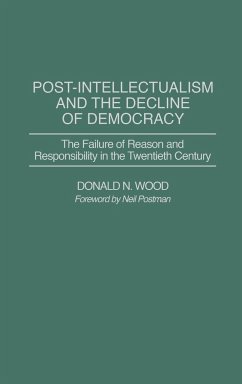Our society's institutional infrastructures-our democratic political system, economic structures, legal practices, and educational establishment-were all created as intellectual outgrowths of the Enlightenment. All our cultural institutions are based on the intellectual idea that an enlightened citizenry could govern its affairs with reason and responsibility. In the late 20th century, however, we are witnessing the disintegration of much of our cultural heritage. Wood argues that this is due to our evolution into a ^Upost-intellectual society^R-a society characterized by a loss of critical thinking, the substitution of information for knowledge, mediated reality, increasing illiteracy, loss of privacy, specialization, psychological isolation, hyper-urbanization, moral anarchy, and political debilitation. These post-intellectual realities are all triggered by three underlying determinants: the failure of linear growth and expansion to sustain our economic system; the runaway information overload; and technological determinism. Wood presents a new and innovative social theory, challenging readers to analyze all our post-intellectual cultural malaise in terms of these three fundamental determinants.
Hinweis: Dieser Artikel kann nur an eine deutsche Lieferadresse ausgeliefert werden.
Hinweis: Dieser Artikel kann nur an eine deutsche Lieferadresse ausgeliefert werden.








